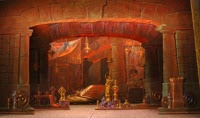Jacob Marley’s Christmas Carol

By Tom Mula, Directed by Jon Ferguson
John Hassler Theater, November 29, 2007
(As Jacob Marley learns, time can move very fast or stand very still, especially around Christmas. I’ve been kindling my Christmas spirit by playing my own version of Bob Cratchit these past weeks. That’s my apology for the lateness of this review.)
I thoroughly enjoyed Tom Mula’s version of the Dickens’ holiday classic at the Jon Hassler Theater. The story is a great mix between what we know (the visits by Christmas spirits to the miserly Scrooge) and what we don’t know: the surprising twists and turns in the otherworld that lead to Scrooge’s annual change of heart. Mula takes the audience on this playful journey while staying true to a Dickens’ formal yet playfully satiric voice.
The Jon Hassler production utilizes four actors who move seamlessly between characters and onstage narration, a technique that works very well. In fact, rather than breaking up the story, the characters’ self-narration makes the audience co-conspirators in the unfolding events of this particular Christmas Eve. This works particularly well for the Bogle (a sprite played by Jane Schranz) who gleefully gossips with the audience over the hapless Marley (played by Charles Fraser) as she guides him through the confusing world of spirits. In a unique twist, this narration often asks the audience to imagine the special effects that a story of the supernatural demands: sometimes this narration is simply humorous; sometimes it’s amazingly effective at creating the illusion of spirits, costumes, crowds, and travel in the other world.
With simple lighting, some simulated wind, and sparse sound effects, the production effectively creates this otherworld. Ralph Ruan’s set utilizes the theater’s wide stage area to good effect, using cantilevered platforms to create the image of a world suspended by chains. The Jon Hassler’s wide performance space can cause problems for the designer (and a “tennis match” experience for the audience); here, as in Mercy of a Storm, Ryan’s design utilizes the space well. In a particularly nice turn of staging, the counting house where Scrooge and Marley spent their accounting days becomes the counting house where Marley must account for his actions as a mortal. Fraser’s Marley is humbled to sit on a stack of ledgers in the counting house&emdash;the same ledgers he piled on Bob Cratchit on Christmas eve.
With a sparse staging and only four actors, the success of Jacob Marley’s Christmas Carol depends on the actors. All four play several characters, including themselves as bumbling actors. For example, they unprofessionally peer at the audience from back stage before acts and even during scenes, and they seemingly can’t remember how scenes are blocked. And yet all four are able to conjure convincing versions of Dickens’s (and Mula’s)characters when the play requires it.
The end result is a production that re-tells Dickens’s classic with ample humor and playfulness as it moves the audience toward the expected catharsis with respect for both the story and the audience intact.
Jacob Marley’s Christmas Carol runs through December 23
Visit the John Hassler Theater for schedules and tickets: Jon Hassler Theater


 Jill Underwood as Sonya and Hal Cropp as Uncle Vanya. Photo: Commonweal
Jill Underwood as Sonya and Hal Cropp as Uncle Vanya. Photo: Commonweal









 One scene from "Drops and Drama III"
One scene from "Drops and Drama III"

